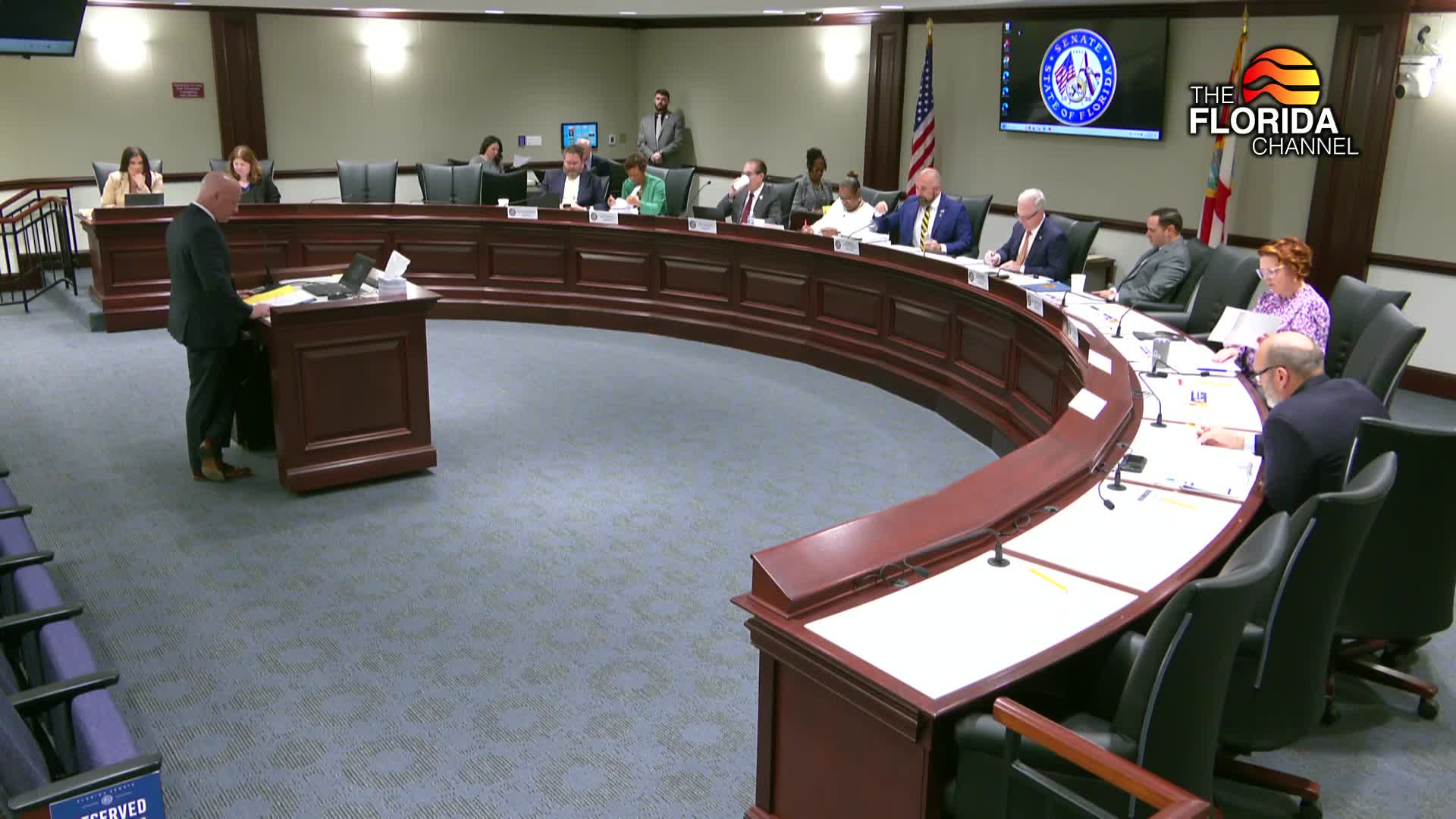Senate committee adopts transportation bill amendment after debate over utility relocation and reimbursements
Get AI-powered insights, summaries, and transcripts
Subscribe
Summary
The Senate Committee on Transportation adopted a substitute amendment to the Department of Transportation package, advancing CS for SB 462 after debate that centered on utility relocation, when FDOT must reimburse utility owners and how disputes should be resolved.
The Senate Committee on Transportation adopted a substitute amendment to the Department of Transportation bill (CS for SB 462) and then reported the bill favorably after extended discussion about utility relocation, reimbursement language and other transportation provisions.
The substitute amendment — described by sponsor Senator Nick DeSigli as requiring a monthly $4,167,000 sales-tax distribution to the State Transportation Trust Fund, new reporting duties for counties to FDOT, authority for FDOT to set highway speed limits in some cases, workforce development grants, contract rebidding rules, and utility relocation and mediation procedures — was offered and adopted on a voice vote before debate on the amended bill continued.
Why it matters: the amendment bundles numerous changes to state transportation policy and FDOT practice that could affect project timelines, who pays to relocate utilities, and how FDOT resolves disputes with utility owners. Several stakeholders warned parts of the bill remain a work in progress and argued some issues belong in administrative coordination rather than statute.
The bill sponsor and substance Senator Nick DeSigli, sponsor of the package, told the committee the amendment covers a range of FDOT authorities and programs, including a monthly distribution to the transportation trust fund to address electric-vehicle impacts and new FDOT mediation boards for utility disputes. He told senators the utility-relocation sections are a "work in progress" and that he intends more stakeholder conversations as the bill moves forward.
Stakeholder testimony and concerns Charlie Dudley, general counsel to the Florida Internet and Television Association, said his membership has participated in FDOT working groups and opposed the amendment in its current form, arguing it is "a little too rigid" and risks intruding on complex field-level coordination. He told the committee the DOT has an existing utility right-of-way working group and that project conditions often change in the field.
Casey Reed of AT&T said communications companies are often last in the sequence of relocations and warned the bill places penalties and permit-withholding in a way that could be harmful. Reed said telecommunications companies are already investing significant sums to occupy rights-of-way and urged proactive coordination rather than a primarily punitive statutory approach.
Sarah Catala, executive director of the Immokalee Water and Sewer District, asked the committee to change reimbursement language from "may" to "shall" (line 1204 in the substitute language) or otherwise make independent special districts eligible for reimbursement. She said two FDOT projects will require roughly $13 million in relocations for her district and that denial of hardship applications has left the district facing higher rates for consumers.
Technical and FDOT perspective Dan Hurtado, who identified himself as a former FDOT chief engineer, told senators the department sees large time and cost impacts when utility relocations do not occur as planned: "Roughly 60 to 70% of all construction claims for additional time or for additional compensation on FDOT construction projects are related to utility relocation issues," he said, citing his experience.
Senators and debate Senator Arrington and Senator Davis pressed the sponsor on details: why the bill uses "may" rather than "shall" for reimbursements, what criteria would trigger FDOT reimbursement, and whether communication providers were intentionally excluded from some reimbursement language. DeSigli said he preferred retaining some discretion for FDOT because circumstances vary and committed to follow-up and further stakeholder work.
Committee action and outcome Senator DeSigli offered and waived closing on the substitute amendment; the chair called the voice vote and the committee announced, "The substitute amendment is adopted. We are back on the bill as amended." Later in the hearing the committee called the roll on CS for SB 462; recorded responses in committee show mixed votes during the roll call and the chair announced, "By your vote, CS for SB 462 is reported favorably."
What remains unresolved Committee members and outside witnesses repeatedly characterized the utility-relocation provisions as evolving language. Senators asked for more precise reimbursement criteria, clarity about which entities qualify for reimbursement, and how arbitration and claims limits would operate. DeSigli and witnesses repeatedly said the language was intended to force stakeholder negotiation and that more changes could be expected before floor action.
Ending The committee advanced the revised FDOT package with the substitute amendment adopted and the committee report favorable. Sponsor DeSigli and witnesses said they will continue outreach to utilities, telecommunications providers, road builders and FDOT staff to refine the utility-relocation, reimbursement and mediation provisions before the bill reaches the full Senate.
